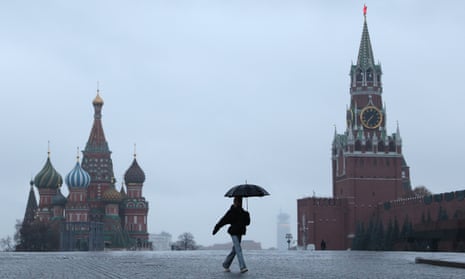Russia and Ukraine are enforcing new coronavirus restrictions at the regional level and pleading with their citizens to get vaccinated, in a sign that both countries have failed to get to grips with rampant outbreaks driven by low vaccination rates.
The restrictions are a grudging effort that authorities say will save lives, as both countries search for an answer to vaccine hesitancy. About 30% of Russians and just 16% of Ukrainians have been fully vaccinated.
Amid a “worst-case scenario” surge of cases, authorities in Moscow shut down non-essential services for 11 days on Thursday, two days before the start of a week-long nationwide paid holiday announced by President Vladimir Putin last weekend. Schools and many offices have been closed in the capital, and restaurants told to offer a takeaway service only.
The Russian army announced plans to set up a coronavirus hospital in the Moscow region. The “specialised hospital” would be staffed by “brigades of doctors and nurses,” the Ministry of Defence said in a statement quoted by state media.
The latest wave of infections in Russia has put the Kremlin in a difficult position. It has had to admit to a failure at the national level at halting the spread of the virus but also wants to distance itself from new lockdown measures, which are extremely unpopular among ordinary Russians.
Records are being broken on an almost daily basis in Russia and Ukraine. On Thursday, Russia reported new one-day highs of 1,159 deaths and 40,000 infections. Ukraine reported a record 734 coronavirus-related deaths on Tuesday, and 576 deaths on Wednesday.
Officials in Ukraine say some people who are required to get vaccinated, such as teachers, have sought to avoid the jab by buying fake vaccination certificates. Kyiv’s local government said it would require residents to present vaccine certificates to use restaurants, gyms, and public transport.
The health minister, Viktor Lyashko, has called a surge in hospital admissions “rampant”. “I call on all of you to get your vaccine,” he said during a briefing on Wednesday. “We can and must stop these sad statistics.”
Under pressure on Thursday, the Kremlin spokesperson, Dmitry Peskov, denied there were plans for compulsory vaccinations in Russia and also denied reports that the Kremlin would relaunch its fledgling pro-vaccination media campaign. Just over 30% of Russians have received two doses of one of Russia’s domestically produced vaccines, according to government data, and according to polls nearly half of the population has ruled out getting jabbed. The Kremlin’s initial target was 60% fully vaccinated by the end of summer.
“Until we attain our goal and achieve the public immunity threshold, we will deem all our efforts to be insufficient,” Peskov said during a telephone briefing with journalists. “These conditions are very simple: an unvaccinated person may die, an unvaccinated person will find one’s life uncomfortable. Harsh conditions are dictated by the circumstances.”
Enforcement of the new lockdowns has largely fallen to regional officials, who have taken on the unpopular task of temporarily closing local businesses or reintroducing the use of unpopular QR codes that were described last year as a “cybergulag.”
“The situation in Moscow is developing according to the worst-case scenario,” the Moscow mayor, Sergei Sobyanin, wrote on his blog as he announced the anti-coronavirus restrictions last week. Advising Muscovites to go to the park or spend a few days at a country house, he wrote: “Let’s relax a bit and we’ll help to save the lives and health of many people. And then the city can get back to normal life.”
Past restrictions have been criticised by Moscow’s small business owners who have lost revenue from customers while seeing little financial support from the government.
Locals in Moscow flocked to bars and restaurants on Wednesday evening before closures took place, while others planned to travel to resorts to avoid staying in Moscow during the impromptu holiday. Cities around Russia, including St Petersburg and Sochi, have braced themselves for an influx of Muscovites hoping to avoid the restrictions. Areas of Crimea, the Ukrainian peninsula annexed by Russia in 2014, have set up checkpoints for vaccination certificates or negative PCR tests.
Under the guidelines, schools in Moscow will be closed, restaurants and cafes will be limited to providing takeout orders, offices will be largely restricted and most in-person government services will be suspended.
Putin this week also confirmed a decision to ban restaurants and bars nationwide from staying open between the hours of 11pm and 7am.
Earlier this week, the head of the Russian laboratory that developed the Sputnik V vaccine said most Russians who claimed they had been vaccinated and then fell ill had bought fake vaccine certificates to avoid getting the jab. “People spend money, and then they get sick and die for their own money,” said Alexander Gintsburg, the head of the Gamaleya centre. “They deceive themselves.”
